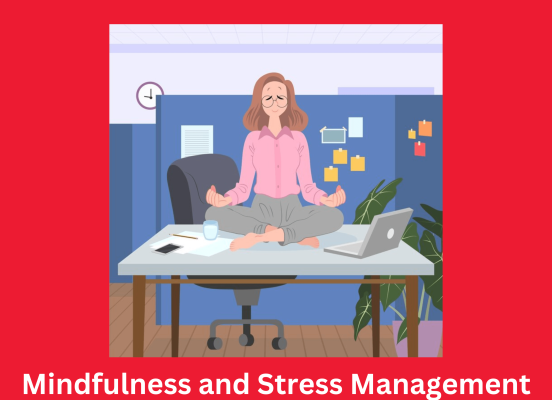

Today’s fast-paced and stressful world makes mindfulness as well as stress management an imperative requirement for good body health, mental stability, and personal wellness in general. Being fully present and engaged in the moment, mindfulness is a useful technique for stress reduction, calmness promotion, as well as emotional equilibrium in an individual under tension.
Sensemaking stress: stress is a way, the body responds naturally to what it thinks of as dangers or challenges. However much some stress is good, prolonged stress can damage a person’s body in a way which might cause physical and mental illnesses. The initial stage in controlling stress is to identify the indicators or clues of stress.
The Benefits of Mindfulness: Mindfulness involves paying attention to the present moment with openness, curiosity, and acceptance. Research has shown that practicing mindfulness can reduce stress, anxiety, and depression while improving focus, resilience, and overall well-being.
Mindfulness Meditation: Meditation involves focusing attention on the breath, bodily sensations, thoughts, and feelings in order to practice mindfulness and it is known to be a central activity of mindfulness. Thus, it is possible to use it for stress reduction and calming the mind through cultivating awareness of present-moment experiences without evaluating them.
Body Scan Meditation: When you do body scan meditation you tend to focus on how your body is responding on a moment-to-moment basis. The aim is to feel what is taking place in different areas and make them more comfortable.
Mindful Breathing Exercises: Breathing exercises are a simple yet powerful way to cultivate mindfulness and reduce stress. By focusing on the breath and observing its rhythm, individuals can calm the mind, regulate emotions, and promote a sense of inner peace.
Mindful Movement Practices: Mindful movement practices such as yoga, tai chi, and qigong combine gentle physical movements with breath awareness and mindfulness techniques. These practices promote relaxation, flexibility, and body-mind integration, reducing stress and enhancing overall well-being.
Gratitude Practice: Cultivating gratitude involves acknowledging and appreciating the positive aspects of life, even in challenging circumstances. Practicing gratitude regularly can shift focus away from stressors and cultivate a more positive outlook on life.
Stress Reduction Techniques: Various stress reduction techniques, such as progressive muscle relaxation, guided imagery, and deep breathing exercises, can help activate the body's relaxation response and counteract the effects of stress on the body and mind.
Setting Boundaries: Setting boundaries and learning to say no to excessive demands on time and energy are essential for stress management. Prioritizing self-care and establishing healthy boundaries can help prevent burnout and promote a more balanced lifestyle.
Mindful Eating: Mindful eating involves bringing awareness to the sensory experience of eating, including sight, smell, taste, and texture. By slowing down and savoring each bite, individuals can develop a healthier relationship with food, reduce stress-related eating, and improve digestion.
Nature Connection: Spending time in nature has been shown to reduce stress levels and promote feelings of well-being. Whether it's taking a walk in the park, gardening, or simply enjoying the outdoors, connecting with nature can provide a sense of calm and rejuvenation.
Social Connection: Cultivating supportive relationships and social connections is crucial for stress management and overall well-being. Spending time with loved ones, sharing experiences, and seeking support from others can help buffer the effects of stress and foster resilience.
Self-Compassion Practice: Self-compassion involves treating oneself with kindness, understanding, and acceptance, especially during times of difficulty or suffering. Practicing self-compassion can reduce self-criticism, promote emotional resilience, and enhance overall well-being.
Mindfulness in Daily Life: Integrating mindfulness into daily activities, such as mindful walking, mindful eating, and mindful communication, can help bring greater awareness and presence to each moment. By incorporating mindfulness into everyday life, individuals can reduce stress and enhance overall well-being.
Cognitive Restructuring: Cognitive restructuring involves identifying and challenging negative thought patterns and beliefs that contribute to stress and anxiety. By reframing negative thoughts and adopting a more balanced perspective, individuals can reduce stress and improve emotional well-being.
Stress Management Workshops and Courses: Participating in stress management workshops or courses can provide valuable tools, techniques, and support for coping with stress and enhancing mindfulness. These programs often include instruction in meditation, relaxation techniques, and stress reduction strategies.
Breath Awareness in Daily Life: Bringing awareness to the breath in daily life can serve as a anchor for mindfulness, helping individuals stay present and centered amidst the busyness of daily activities. Pausing to take a few mindful breaths throughout the day can promote relaxation and reduce stress.
"Setting Realistic Expectations: It's important to set realistic expectations so that you and those around you don’t feel overwhelmed by stress. Stress can be minimized and a state of stability sustained if tasks are scheduled according to priorities and rational objectives are put in place."
Mindfulness-Based Stress Reduction (MBSR): Mindfulness-Based Stress Reduction (MBSR) is a program that is structured where mindfulness meditation, yoga and cognitive-behavioral techniques are combined to lower levels of anxiety, prevent distress and improve health. MBSR has proved useful in lessening stress symptoms while enhancing life quality.
Title: Self-Care PracticesSelf-care practices help in managing the physical, emotional and mental health by doing regular exercises, relaxation, hobbies like reading, and leisure activities like watching movies. Prioritizing on caring for oneself gives people time to replenish their energy (recharge), thus reducing stress and improving the general quality of life.
To sum up, mindfulness as well as managing stress have techniques which are invaluable in decreasing stress levels and heightening people’s overall happiness making one’s day-to-day living balanced and stronger. The act of incorporating personal care programs and mindfulness exercises in the course of stress reduction strategies is what makes it possible for individuals to lead an easy life full of fun and pleasure.